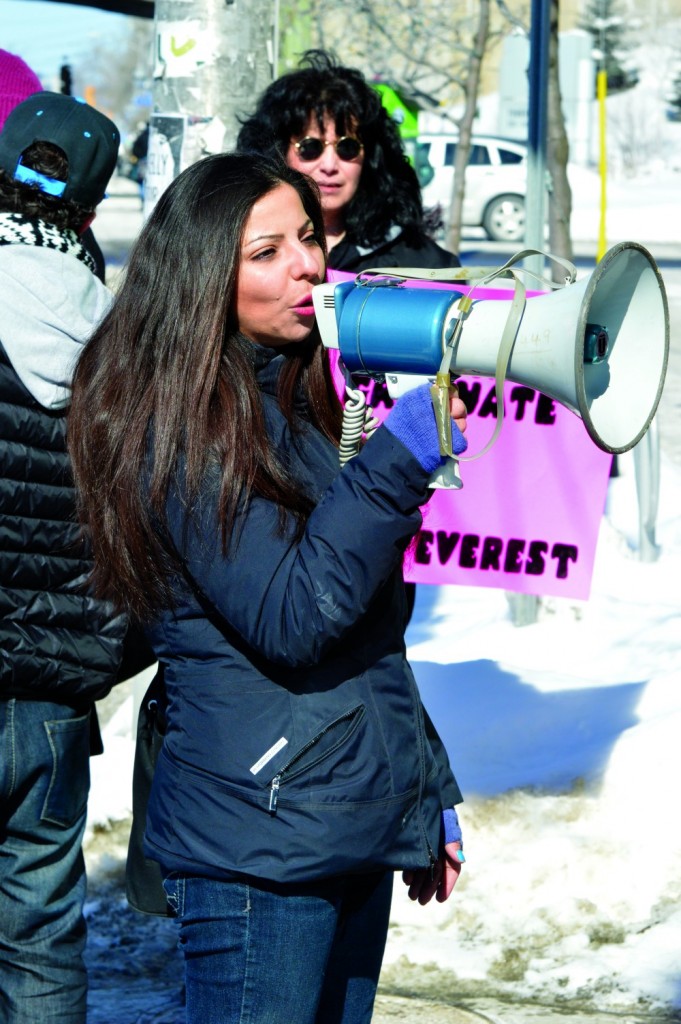Leaving Iran, Chiman Rahiminejad thought she would be able to get a proper education, free from prejudice of her Kurdish roots.
She had a family and a comfortable job, making $2,000-$3,000 per month. But she had no employment security after being barred from school due to Iran’s discrimination.
That is why she left her family behind and moved to Canada.
However, on Feb. 27, standing in the cold outside the ministry of training, colleges and universities office on Preston Street, Rahiminejad, a 30-year-old medical lab technician student, shouted into the megaphone to express the anguish that the closure of Everest College has caused her.
“I don’t live in your land to be treated like this,” Rahiminejad exclaimed to anyone who would listen.
The crowd of Everest students and staff, all displaced by the shutdown, cheered for her as cars drove by, honking to declare their support.
Rahiminejad said she was studying for her medical exam with friends and was halfway through the final question in their review quiz when they were confronted with the news.
“A lady comes in and stands on a chair, saying (Everest’s) licenses were revoked and that everyone is free to go home,” said Rahiminejad. “In 20 minutes, the entire school was empty.”
Now, without any family in Canada and without an education to return home with, she is left with much more to worry about than her upcoming exam.
“I can’t sleep at night,” she said.

Her story is just one of many, as Everest’s closure has abruptly driven out both staff and students.
Everest shut down immediately after their parent company, Corinthian Colleges, filed for Canadian bankruptcy protection Feb. 20. This news affected over 2,400 students and 450 staff members.
In an effort to assist them, Algonquin is trying to get approval from the MTCU for former Everest students to transfer into programs similar to that which they were attending.
Cheryl Jensen, president of Algonquin, told the Times that Everest students had shown a substantial interest in making the switch to Algonquin once the transfers were approved by the MTCU. Algonquin held an information session for interested students on Feb. 26.
Marketing officer Janice Pryce said that Algonquin needs to make sure that transfer students would fit into their new programs, but that nothing can go forward until the MTCU approves it.
“No one can really make any decisions at this point because the ministry has to identify training centers. Until they identify Algonquin as a training center, we can’t take any students in,” said Pryce.
But even if students were to transfer into other schools, there is still the question of where Everest teachers will go next.
Ron Rousseaux, 61, taught accounting at Everest for 29 years. He has nowhere to turn to now, fearing employers will pass over him because of his age.
“(They) paid us for our last week of work and vacation pay,” said Rousseaux.
He could apply for the wage earner protection program, a form of federal assistance for employees when their employers declare bankruptcy. But he said that there wasn’t a guarantee he would receive it.
Many students spoke of their sorrow on losing their instructors, who they felt were excellent guides that cared for and encouraged their learning.
“Everyone in our school seemed to really care about our future. Our success was actually important to them,” said Deana Piett, 28, a medical office administration student. “I’ve never been to a school like that before.
“A lot of people are saying, ‘Oh, you know, these scam schools,’ and, ‘They just give you good grades just to get you through.’ That’s not the case at all. Our teacher has gone out of her way, outside of school as well, to help us.”
Jason Teale, 47, has taught at Everest for the past nine years and is now worried for the future of his students. He said he taught his students like they were his peers through getting to know each of them individually and encouraging them no matter the task ahead.
“It was all about engaging the students and allowing kids to become transformational and letting them ultimately find who they are inside, so that they realize, ‘Hey, maybe I can do this,’” said Teale, formerly a teacher of massage therapy and soft skills at Everest.
Students were forthcoming in how the school’s closure has upset their futures, putting their plans on hold.
Maureen Brill, 55, another medical office administration student, was set to graduate a week after the college closed.
“I just spent basically 50 out of the 51 weeks at school to get a diploma at 55,” said Brill. “I was having difficulty getting a job because 30 years experience doesn’t equate to a diploma.”
She was set to graduate with honours, but now faces OSAP payments and a future without a diploma.
Kaitlin Kennedy, 30, was also an honour roll medical office administration student, with a perfect attendance and a 97 per cent average. She thought she had her life perfectly planned out with her graduation set for Aug. 21.
“I wanted to start a family. I intended to start trying with my husband in the fall,” said Kennedy, choking back tears. “I don’t know if that’s going to happen now.
“We all have lives. We all have plans, and to put us on hold like this, and for them to get organized, it’s just not right.”
Meanwhile, Everest students and staff are left with nowhere to learn.
“If they were protecting us when I registered in July, I should have been told not to come to this school,” said Kennedy.
With files from Patrick Jodoin, Joseph Gedeon and David Hobbs


